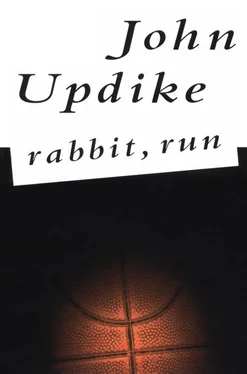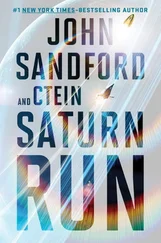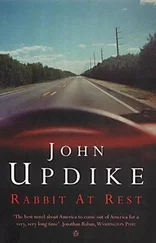A dread of marring his freedom blocks the easy gesture of expressing gratitude. Thin—upped, Rabbit pronounces, "Thanks."
They go downstairs. Contrary to what Tothero had promised, all of the men —old men, mostly, but not very old, so their misshapen bodies have a nasty vigor – look up with interest at him. Insanely, Tothero introduces him repeatedly: "Fred, this is my finest boy, a wonderful basketball player, Harry Angstrom, you probably remember his name from the papers, he twice set a county record, in 1950 and then he broke it in 1951, a wonderful accomplishment."
"Is that right, Marty?"
"Harry, an honor to meet you."
Their alert colorless eyes, little dark smears like their mouths, feed on the strange sight of him and send acid impressions down to be digested in their disgusting big beer—tough stomachs. Rabbit sees that Tothero is a fool to them, and is ashamed of his friend and of himself. He hides in the lavatory. The paint is worn off the toilet seat and the wash—basin is stained by the hot—water faucet's rusty tears; the walls are oily and the towel—rack empty. There is something terrible in the height of the tiny ceiling: a square yard of a dainty metal pattern covered with cobwebs in which a few white husks of insects are suspended. His depression deepens, becomes a kind of paralysis; he walks out and rejoins Tothero limping and stiffly grimacing, and they leave the place in a dream. He feels affronted, vaguely invaded, when Tothero gets into his car. But, just as in a dream he never stops to question, Rabbit slides in behind the wheel. In the renewed relation of his arms and legs to the switches and pedals, he finds power. His wet—combed hair feels chilly on his head.
He says sharply, "So you think I should've drunk with Janice."
"Do what the heart commands," Tothero says. "The heart is our only guide." He sounds weary and far away.
"Into Brewer?"
There is no answer.
Rabbit drives up the alley, coming to Potter Avenue, where the water from the ice plant used to run down. He goes right, away from Wilbur Street, where his apartment is, and two more turns bring him into Central Street heading around the mountain to Brewer. On the left, land drops away into a chasm floored by the slick still width of the Running Horse River; on the right, gasoline stations glow, twirlers flicker on strings, spotlights protest.
As the town thins, Tothero's tongue loosens. "The ladies we're going to meet, now Harry, I have no conception ofwhat the other one will be like, but I know you'll be a gentleman. And I guarantee you'll like my friend. She is a remarkable girl, Harry, with seven strikes against her from birth, but she's done a remarkable thing."
"What?"
"She's come to grips. Isn't that the whole secret, Harry; to come to grips? It makes me happy, happy and humble, to have, as I do, this very tenuous association with her. Harry?"
"Yeah?"
"Do you realize, Harry, that a young woman has hair on every part of her body?"
"I hadn't thought about it." Distaste stains his throat.
"Do," Tothero says. "Do think about it. They are monkeys, Harry. Women are monkeys."
He says it so solemn, Rabbit has to laugh.
Tothero laughs too, and comes closer on the seat. "Yet we love them, Harry, don't we? Harry, why do we love them? Answer that, and you'll answer the riddle of life." He is squirming around, crossing and uncrossing his legs, leaning over and tapping Rabbit's shoulder and then jerking back and glancing out the side window and turning and tapping again. "I am a hideous person, Harry. A person to be abhorred. Harry, let me tell you something." As a coach he was always telling you something. "My wife calls me a person to be abhorred. But do you know when it began? It began with her skin. One day in the spring, in nineteen forty—three or four, it was during the war, without warning it was hideous. It was like the hides of a thousand lizards stitched together. Stitched together clumsily. Can you picture that? That sense of it being in pieces horrified me, Harry. Are you listening? You're not listening. You're wondering why you came to me."
"What you said about Janice this morning kind of worries me."
` Janice! Let's not talk about little mutts like Janice Springer, Harry boy. This is the night. This is no time for pity. The real women are dropping down out of the trees." With his hands he imitates things falling out of trees. "Plip, plip, plippity!"
Even discounting the man as a maniac, Rabbit becomes expectant. They park the car off Weiser Avenue and meet the girls in front of a Chinese restaurant.
The girls waiting under crimson neon have a floral delicacy; like a touch of wilt the red light rims their fluffy hair. Rabbit's heart thumps ahead of him down the pavement. They all come together and Tothero introduces Margaret: "Margaret Kosko, Harry Angstrom, my finest athlete, it's a pleasure for me to be able to introduce two such wonderful young people to one another." The old man's manner is queerly shy; his voice has a cough waiting in it.
After Tothero's build—up Rabbit is amazed that Margaret is just another Janice – the same sallow density, that stubborn smallness. Scarcely moving her lips, she says, "This is Ruth Leonard. Marty Tothero, and you, whatever your name is."
"Harry," Rabbit says. "Or Rabbit."
"That's right!" Tothero cries. "The other boys used to call you Rabbit. I had forgotten." He coughs.
"Well you're a big bunny," Ruth remarks. She is fat alongside Margaret, but not that fat. Chunky, more. But tall, five eight or nine. She has flat blue eyes in square—cut sockets. Her thighs fill the front of her pseudo—silk pale—green dress so that even standing up she has a lap. Her hair, kind of a dirty ginger color, is bundled in a roll at the back of her head. Beyond her the parking meters with their red tongues recede along the curb, and at her feet, pinched in lavender straps, four sidewalk squares meet in an X.
"Just big outside," he said.
"That's me too," she says.
"God I'm hungry," Rabbit tells them all, just to say something. From somewhere he's got the jitters.
"Hunger, hunger," Tothero says, as if grateful for the cue. "Where shall my little ones go?"
"Here?" Harry asks. He sees from the way the two girls look at him that he is expected to take charge. Tothero is moving back and forth like a crab sideways and bumps into a middle—aged couple strolling along. His face shows such surprise at the collision, and he is so elaborately apologetic, that Ruth laughs; her laugh rings on the street like a handful of change thrown down. At the sound Rabbit begins to loosen up; the space between the muscles of his chest feels padded with warm air. Tothero pushes into the glass door first, Margaret follows, and Ruth takes his arm and says, "I know you. I went to West Brewer High and got out in fifty—one."
"That's my class." Like the touch of her hand on his arm, her being his age pleases him, as if, even in high schools on opposite sides of the city, they have learned the same things and gained the same view of life. The Class of '51 view.
"You beat us," she says.
"You had a lousy team."
"No we didn't. I went with three of the players."
"Three at once?"
"In a way."
"Well. They looked tired."
She laughs again, the coins thrown down, though he feels ashamed of what he has said, she is so good—natured and maybe was pretty then. Her complexion isn't good now. But her hair is thick, and that's the sign.
A young Chinaman in a drab linen coat blocks their way past the glass counter where an American girl in a kimono sits counting threadbare bills. "Please, how many?"
"Four," Rabbit says, when Tothero is silent.
In an unexpected trusting gesture Ruth slips off her short white coat and gives it to Rabbit; soft, bunched cloth. The motion stirs up a smell of perfume on her.
Читать дальше












